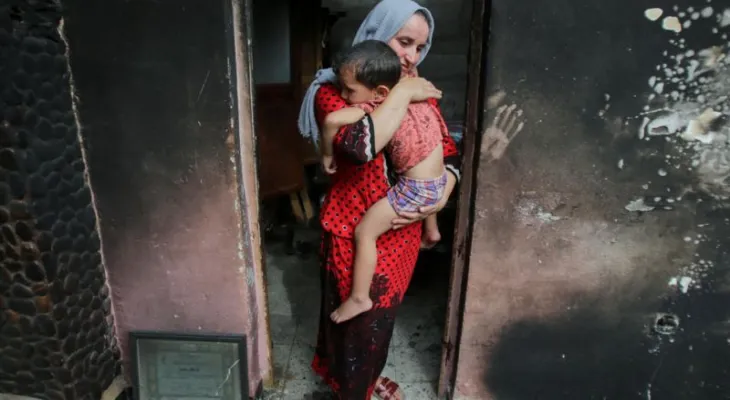Search here
Newspaper
Search here

Arab Canada News
News

Published: August 9, 2023
"I lost nine members of my family because of the fires," said Abdel Aziz Chiban, referring to the fires that reached his village in just seven minutes, coming from a neighboring town.
Chiban indicated that his village, Ait Saleh, in the Tizi Ouzou province, in the north of the country, lost 16 members of its community due to the fires last month.
He added that the greatest support came from the residents of neighboring villages, who provided them with what they needed after almost everything they had burned.
The Algerian, Fatiha Mohamed, stated that Algeria, like all other North African countries, has been suffering from rising temperatures lately, which significantly affects the environment and leads to the destruction of natural areas and agricultural crops.
Regarding the impact of these fires on the population and local communities, Fatiha said that the fires have catastrophic effects on people and communities, as "many people are displaced, losing their homes and belongings, and are forced to seek shelter elsewhere."
Do extreme heatwaves affect the future summer tourism market in Europe?
She also noted that "the thick smoke resulting from the fires affects air quality, increasing the risks of respiratory diseases among the population," adding that local economic activities "are greatly affected," as work in agriculture and industry is disrupted due to the fires and their repercussions. Fatiha described the heatwaves as "stealing the joy of summer from local residents, depriving them of tourism revenues that have been harmed by the high temperatures."
More than 40 people have been killed - most of them in Algeria - due to wildfires that broke out in many areas on both sides of the Mediterranean Sea, threatening residential areas and tourist resorts, prompting governments to evacuate thousands of people.
Algeria announced the extinguishing of fires that reached 140, which broke out in various provinces, according to the country's Interior Minister, Ibrahim Mourad.
In Tunisia as well, the Tunisian Interior Minister, Kamal Fekih, announced at the end of July that full control had been achieved over the fires that broke out in several areas and forests of the country.
Fekih clarified that 600 citizens were evacuated from the forests and fields near the fires, and all of them have returned to their homes.
As for the Tunisian Adel Salmi, whose restaurant was completely burned, he told the BBC, "When I returned in the morning, I found that 80 percent of the restaurant had burned."
He added, "We had a traditional oven and a dining area, both of which burned down, and there was a room designated for cooling, but it also burned completely, containing all kinds of food. I run this restaurant with my wife, and I have 22 workers here."
Heatwave: How have citizens in Tunisia and Algeria been affected by the fires?
A severe heatwave has affected large parts of the Northern Hemisphere since the beginning of this summer, with record temperatures recorded in several areas of the world, including North Africa and the Mediterranean basin, last month.
The Moroccan Directorate General of Meteorology announced registration of temperatures in some areas of the country reaching 48 degrees Celsius.
Meanwhile, the National Meteorological Office of Algeria announced that the temperature in Adrar province, in the southwest of the country, recorded 49 degrees Celsius in July, ranking second globally, according to a post by the office on Twitter.
Several Algerian provinces experienced a severe heatwave, where temperatures exceeded 50 degrees Celsius at the beginning of July.
This summer, Tunisia recorded record rates, with maximum temperatures reaching 50 degrees Celsius.
The heatwave also affected Egypt, as the Egyptian General Authority for Meteorology announced that the country recorded an "unprecedented" rise in temperatures.
Temperatures in Cairo and northern provinces reached 43 degrees Celsius, while in southern provinces and southern Sinai they reached 45 degrees Celsius.
The Egyptian government confirmed earlier last month that a temporary electricity load-shedding period had begun due to "the heatwave and increased electrical consumption, and the rising volume of gas consumption used in its production," according to an official statement.
This led to a wave of public criticism against the government due to the significant damage inflicted on the Egyptian citizens.
The effects of the heatwave reached Gaza City, where temperatures soared to 38 degrees Celsius, leading to an exacerbation of the electricity shortage crisis and residents' dissatisfaction, who expressed frustration toward the Islamic resistance movement (Hamas) that controls the sector.
More than 2.3 million Palestinians live in the narrow coastal strip between Egypt and Israel, suffering from frequent power outages lasting up to 12 hours a day.
In his remarks, a member of the Egyptian Tourism Chamber, Magdy Sadiq, stated that tourist bookings across Egypt have not been affected by the heatwave.
He added that the Egyptian government's exemption of the tourism sector from electricity cuts contributed to maintaining hotel bookings, which reached 90% in June and 100% in July.
Comments